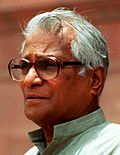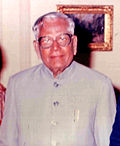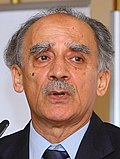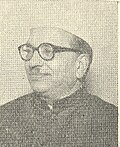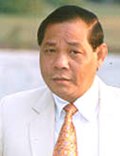| Portrait | Minister
(Birth-Death)
Constituency | Term of office | Political party | Ministry | Prime Minister |
|---|
| From | To | Period |
|---|
| Minister of Commerce |
|---|
| | C. H. Bhabha
(1910–1986) | 15 August 1947 | 6 April 1948 | 235 days | Indian National Congress | Nehru I | | Jawaharlal Nehru |
|  | Kshitish Chandra Neogy
(1888–1970)
MCA for West Bengal | 6 April 1948 | 19 April 1950 | 2 years, 13 days |
|  | Jawaharlal Nehru
(1889–1964)
MP for United Provinces
(Prime Minister) | 19 April 1950 | 29 May 1950 | 40 days |
|  | Sri Prakasa
(1890–1971) | 29 May 1950 | 26 December 1950 | 211 days |
| Minister of Commerce and Industry |
|---|
|  | Harekrushna Mahatab
(1899–1987)
MP for Orissa (Interim) | 26 December 1950 | 13 May 1952 | 1 year, 139 days | Indian National Congress | Nehru I | | Jawaharlal Nehru |
|  | T. T. Krishnamachari
(1899–1974)
MP for Madras South | 13 May 1952 | 30 August 1956 | 4 years, 109 days | Nehru II |
| Minister of Commerce and Consumer Industries |
|---|
|  | Swaran Singh
(1907–1994)
Rajya Sabha MP for Punjab | 30 August 1956 | 14 November 1956 | 76 days | Indian National Congress | Nehru II | | Jawaharlal Nehru |
|  | Morarji Desai
(1896–1995)
Unelected | 14 November 1956 | 1 January 1957 | 48 days |
| Minister of Commerce and Industry |
|---|
|  | Morarji Desai
(1896–1995)
Unelected, until April 1957
MP for Surat, from April 1957 | 1 January 1957 | 28 March 1958 | 1 year, 86 days | Indian National Congress | Nehru II | | Jawaharlal Nehru |
| Nehru III |
|  | Lal Bahadur Shastri
(1904–1966)
MP for Allahabad | 28 March 1958 | 5 April 1961 | 3 years, 8 days |
| 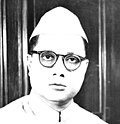 | K. Chengalaraya Reddy
(1902–1976)
MP for Kolar | 5 April 1961 | 19 July 1963 | 2 years, 105 days |
| Nehru IV |
| Minister of International Trade |
|---|
|  | Manubhai Shah
(1915–2000)
MP for Jamnagar
(Minister of State) | 19 July 1963 | 9 June 1964 | 313 days | Indian National Congress | Nehru IV | | Jawaharlal Nehru |
| Nanda I | | Gulzarilal Nanda |
| Minister of Commerce |
|---|
|  | Manubhai Shah
(1915–2000)
MP for Jamnagar
(Minister of State until 24 Jan 1966) | 9 June 1964 | 13 March 1967 | 2 years, 277 days | Indian National Congress | Shastri | | Lal Bahadur Shastri |
| Nanda II | | Gulzarilal Nanda |
| Indira I | | Indira Gandhi |
| 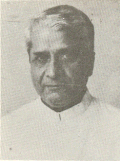 | Dinesh Singh
(1925–1995)
MP for Pratapgarh | 13 March 1967 | 14 February 1969 | 1 year, 338 days | Indian National Congress | Indira II |
| Minister of Foreign Trade and Supply |
|---|
|  | Bali Ram Bhagat
(1922–2011)
MP for Arrah | 14 February 1969 | 4 November 1969 | 263 days | Indian National Congress (R) | Indira II | | Indira Gandhi |
| Minister of Foreign Trade |
|---|
|  | Bali Ram Bhagat
(1922–2011)
MP for Arrah | 4 November 1969 | 27 June 1970 | 235 days | Indian National Congress (R) | Indira II | | Indira Gandhi |
|  | Lalit Narayan Mishra
(1923–1975)
Rajya Sabha MP for Bihar, until 1972
MP for Darbhanga, from 1972
(Minister of State) | 27 June 1970 | 18 March 1971 | 2 years, 223 days |
| 18 March 1971 | 5 February 1973 | Indira III |
| Minister of Commerce |
|---|
|  | D. P. Chattopadhyaya
(1933–2022)
Rajya Sabha MP for West Bengal
(Minister of State until 23 Dec 1976) | 5 February 1973 | 24 March 1977 | 4 years, 47 days | Indian National Congress (R) | Indira III | | Indira Gandhi |
|  | Mohan Dharia
(1925–2013)
MP for Pune | 24 March 1977 | 28 July 1979 | 2 years, 126 days | Janata Party | Desai | | Morarji Desai |
|  | Hitendra Kanaiyalal Desai
(1915–1993)
MP for Godhra | 30 July 1979 | 14 January 1980 | 349 days | Janata Party (Secular) | Charan | | Charan Singh |
|  | Pranab Mukherjee
(1935–2020)
Rajya Sabha MP for Gujarat | 14 January 1980 | 15 January 1982 | 2 years, 1 day | Indian National Congress (I) | Indira IV | | Indira Gandhi |
|  | Shivraj Patil
(born 1935)
MP for Latur
(Minister of State, I/C) | 15 January 1982 | 29 January 1983 | 1 year, 14 days |
| 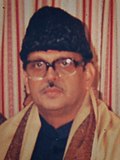 | V. P. Singh
(1931–2008)
Rajya Sabha MP for Uttar Pradesh | 29 January 1983 | 7 September 1984 | 1 year, 222 days |
|  | Pranab Mukherjee
(1935–2020)
Rajya Sabha MP for Gujarat | 7 September 1984 | 31 October 1984 | 54 days |
| Minister of Commerce and Supply |
|---|
|  | Pranab Mukherjee
(1935–2020)
Rajya Sabha MP for Gujarat | 31 October 1984 | 31 December 1984 | 61 days | Indian National Congress (I) | Rajiv I | | Rajiv Gandhi |
| 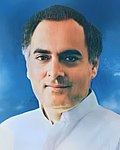 | Rajiv Gandhi
(1944–1991)
MP for Amethi
(Prime Minister) | 31 December 1984 | 14 January 1985 | 14 days | Rajiv II |
|  | V. P. Singh
(1931–2008)
Rajya Sabha MP for Uttar Pradesh | 14 January 1985 | 30 March 1985 | 75 days |
| Minister of Commerce |
|---|
|  | V. P. Singh
(1931–2008)
Rajya Sabha MP for Uttar Pradesh | 30 March 1985 | 25 September 1985 | 179 days | Indian National Congress (I) | Rajiv II | | Rajiv Gandhi |
|  | Khurshed Alam Khan
(1919–2013)
MP for Farrukhabad
(Minister of State, I/C) | 25 September 1985 | 15 November 1985 | 51 days |
|  | Arjun Singh
(1930–2011)
MP for South Delhi | 15 November 1985 | 20 January 1986 | 66 days |
| 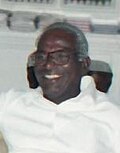 | P. Shiv Shankar
(1929–2017)
Rajya Sabha MP for Gujarat | 20 January 1986 | 25 July 1987 | 1 year, 186 days |
|  | N. D. Tiwari
(1925–2018)
Rajya Sabha MP for Uttar Pradesh | 25 July 1987 | 25 June 1988 | 336 days |
|  | Dinesh Singh
(1925–1995)
MP for Pratapgarh | 25 June 1988 | 2 December 1989 | 1 year, 160 days |
|  | V. P. Singh
(1931–2008)
MP for Fatehpur
(Prime Minister) | 2 December 1989 | 5 December 1989 | 3 days | Janata Dal | Vishwanath | | V. P. Singh |
|  | Arun Nehru
(1944–2013)
MP for Bilhaur | 6 December 1989 | 10 November 1990 | 339 days |
|  | Chandra Shekhar
(1927–2007)
MP for Ballia
(Prime Minister) | 10 November 1990 | 21 November 1990 | 11 days | Samajwadi Janata Party (Rashtriya) | Chandra Shekhar | | Chandra Shekhar |
| 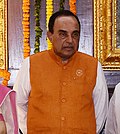 | Subramanian Swamy
(born 1939)
Rajya Sabha MP for Uttar Pradesh | 21 November 1990 | 21 June 1991 | 212 days | Janata Party |
|  | P. Chidambaram
(born 1945)
MP for Sivaganga
(Minister of State, I/C) | 21 June 1991 | 9 July 1992 | 1 year, 18 days | Indian National Congress (I) | Rao | | P. V. Narasimha Rao |
| 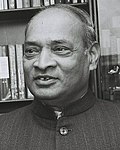 | P. V. Narasimha Rao
(1921–2004)
MP for Nandyal
(Prime Minister) | 9 July 1992 | 17 January 1993 | 192 days |
|  | Pranab Mukherjee
(1935–2020)
Rajya MP for West Bengal | 18 January 1993 | 10 February 1995 | 2 years, 23 days |
|  | P. Chidambaram
(born 1945)
MP for Sivaganga
(Minister of State, I/C) | 10 February 1995 | 3 April 1996 | 1 year, 53 days |
|  | P. V. Narasimha Rao
(1921–2004)
MP for Nandyal
(Prime Minister) | 3 April 1996 | 16 May 1996 | 43 days |
| 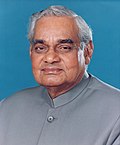 | Atal Bihari Vajpayee
(1924–2018)
MP for Lucknow
(Prime Minister) | 16 May 1996 | 1 June 1996 | 16 days | Bharatiya Janata Party | Vajpayee I | | Atal Bihari Vajpayee |
|  | Devendra Prasad Yadav
(born 1953)
MP for Jhanjharpur | 1 June 1996 | 29 June 1996 | 28 days | Janata Dal | Deve Gowda | | H. D. Deve Gowda |
|  | Bolla Bulli Ramaiah
(1926–2018)
MP for Eluru
(Minister of State, I/C) | 29 June 1996 | 21 April 1997 | 296 days | Telugu Desam Party |
| 21 April 1997 | 19 March 1998 | Gujral | | I. K. Gujral |
|  | Ramakrishna Hegde
(1926–2004)
Rajya Sabha MP for Karnataka | 19 March 1998 | 13 October 1999 | 1 year, 208 days | Lok Shakti | Vajpayee II | | Atal Bihari Vajpayee |
| Merged with Ministry of Industry to constitute the Ministry of Commerce and Industry. |
|---|
|












































